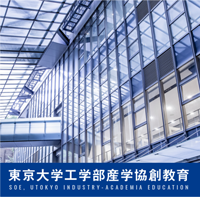Report on the 3rd Special Lecture
December 19, 2022
Special Lecture
The 3rd Special Lecture of the Metaverse School of Engineering was given by Dr. Naoko Ishii, Executive Director, on the topic of “Report in line with the COP27 Egypt meeting". She has just attended COP27 of the United Nations Framework Convention on Climate Change (UNFCCC) held in Egypt and COP15 of the Convention on Biological Diversity (CBD) held in Montreal, and gave a report on the real atmosphere of COP.
Content of Lecture
Lecture: Executive Director of the University of Tokyo, Professor of the Future Vision Research Center, Director of the Global Commons Center
Dr. Naoko Ishii
Title: Report in line with the COP27 Egypt meeting
COP15 of the Convention on Biological Diversity was held in Montreal, Canada, and although people tend to think that COP means climate change, COP is the Conference of the Parties to the Convention, and biodiversity is one of its topics. Climate change is only one part of the global environmental problem, implying that we need to look at the big picture to get to the essence of the problem.
In the long history of humanity, we are in the midst of a very big change, moving from the geological era known as the Holocene to the Anthropocene, an era in which humans are the only species to have a significant impact on the global environment. For most of the past, global temperatures have fluctuated in the cold range. This was followed by the Holocene epoch, a warm and stable period that began about 12,000 years ago. In this stable climate, agriculture became possible, the population grew, cities were established, and civilization developed. In other words, human civilization has only known this Holocene epoch.
Today, however, we have jumped over the framework of the stable earth system of the Holocene epoch, which supported our civilization until now, and have destroyed the foundations of our civilization ourselves. Particularly since the Industrial Revolution, human activities have achieved great development, measured by all criteria of population, growth, and investment, but at the same time the burden on the global environment has expanded rapidly.
As a result of this rapid increase in the burden on the global environment, distortions have occurred everywhere, causing major problems such as climate change, loss of biodiversity, and pollution of the oceans and soil. The challenge now is how to bring the Earth system back to its original stable condition, and we define "global commons" as the stability and self-healing power (resilience) of this system. It is the mission of the Global Commons Center to help everyone achieve responsible management of the global commons so that we can pass it on to the next generation.
The United Nations Conference on Environment and Development in 1992 led to the creation of the so-called Rio 3 Conventions: the Framework Convention on Climate Change, the Convention on Biological Diversity, and the Convention to Combat Desertification. However, it is clear how difficult it is to protect the global commons through treaties between nations, as evidenced by the fact that even after 30 years, global warming has not stopped and biodiversity is rapidly being lost. Nevertheless, in the 2010s, there was a considerable increase in awareness around the world that our relationship with the earth is not sustainable and that the current social and economic system as it is today is not sustainable, leading to the Paris Agreement in 2015.
.png?width=369&height=208&name=%E3%82%B9%E3%82%AF%E3%83%AA%E3%83%BC%E3%83%B3%E3%82%B7%E3%83%A7%E3%83%83%E3%83%88%20(60).png)
Now, regarding the efforts of the COP, the Japanese press has mainly followed the government negotiations part. But in fact, what really drives and influences the COP are the negotiators who have gathered there. There is collaboration not only among state negotiators, but also among so-called “Non-state actors”. NGOs, civil society organizations, academia, and global companies are taking the lead in collaborating across borders on each issue, setting industry rules and business practices, and moving everyone one step closer to a shift. If we only look at intergovernmental negotiations, we almost always miss what is happening in the "parallel world" behind the negotiations. We lose sight of what biodiversity is, what the negotiations are about, and what is being discussed.
In the 2015 Paris Agreement, this push by non-state actors led to a landmark success. Last year at COP26 in Glasgow, in a "parallel world" rather than intergovernmental, a financial sector alliance called GFANZ (Glasgow Financial Alliance for Net Zero) announced its commitment to accelerate net zero. There were also several notable achievements, such as the formation of the International Sustainability Standards Board (ISSB) to standardize the disparate sustainability disclosure standards around the world.
This year's Climate Change COP27 was quite a challenging conference. Intergovernmental negotiations became increasingly difficult due to the situation in Ukraine. There was even a trend to scrap the 1.5°C target that had been presented in Glasgow, but I believe that the intergovernmental negotiations were successful in that they managed to stay on track. However, in the "parallel world," which is centered on non-state actors, for the first time in the 27-year history of the COP, a pavilion on food systems was created, and I think this was a great achievement.
The food system is now in a critical situation. First of all, 30% of all greenhouse gas emissions come from food production. It is also 70% of the cause of biodiversity loss, and--this is also critical--70% of water withdrawal is used to increase food production. A significant portion of the damage from phosphorus and nitrogen also comes from food production. How do we produce food as the population continues to grow? The issue of regenerating agriculture will become an increasingly important issue in the future.
So, how should we act as individuals? First, you need to consider your role and your global impact. It is important to always think about where your actions fit into the global picture. We tend to think that all we need to do is to be happy in our own compartment, but we need to think about our role in the international society and Japanese society. Only by considering our role in the international and Japanese society can we see what we should do in relation to the global scale, and we can be involved in setting global rules within our role. This is what I believe is important.
Event Report
.png?width=369&height=226&name=%E3%82%B9%E3%82%AF%E3%83%AA%E3%83%BC%E3%83%B3%E3%82%B7%E3%83%A7%E3%83%83%E3%83%88%20(65).png)
The third Special Lecture of the Metaverse School of Engineering featured Dr. Naoko Ishii, Director of the Global Commons Center and Executive Director of the University of Tokyo. The event was conducted completely online, with a total of 61 participants from inside and outside the university.
Dr. Ishii, who just returned from the COP15 on Biodiversity held in Montreal, spoke about the nature of the global environmental crisis, the need to transform social and economic systems to solve the crisis, and the importance of achieving a global commons. Many students may have had the perception that COP was about climate change, but there are many other global environmental issues that need to be tackled urgently, and she explained the big picture, including the background, to solve them comprehensively.
I myself listened to the lecture after participating in a start-up event held in Finland, an environmentally conscious country in Northern Europe, so I thought I had some knowledge about environmental issues, but I was only aware of individual events and had never considered the big picture, such as frameworks to promote systemic change. I keenly felt that my perspective was still too narrow.
I was also impressed by the fact she repeatedly emphasized at the COP, that the Japanese media focuses only on intergovernmental negotiations and fails to grasp the discussions and circumstances taking place behind the scenes, thus falling behind the rest of the world. I learned that it is important to actively gather information from overseas media in order to understand global trends. In her talk on the importance of cooperation and activities by non-state actors in a parallel world, Dr. Someya suggested that, in addition to becoming a member of a large corporation as a non-state actor, one can also become a game changer as a start-up. I believe that this lecture made us think about what we can do in the future from our own standpoints.
(Written by Yui Kitani, first-year master's student at the Graduate School of Engineering)
Contact us
METAVERSE SCHOOL OF ENGINEERING




